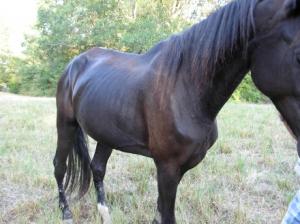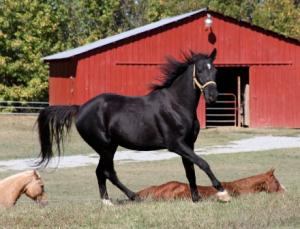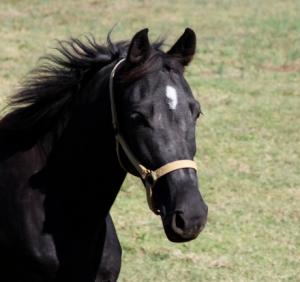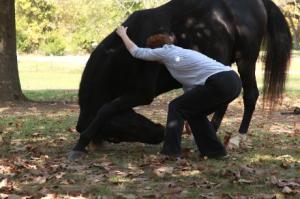By Nancy Brannon
Glenda Brown has been painting her whole life. She is a portrait artist, and occasionally does some landscape paintings. Besides her family, she loves two things: art and horses. “I never dreamed my work would do so well,” she said. “It’s gone farther than I ever imagined!” There’s another part of her life that she never imagined: rescuing a starving horse, who has now become, more or less, her shadow. He’s a Tennessee Walking Horse named Black Jack.
Brown lives in rural west Tennessee; her home is surrounded by farmland, both row crop and pastureland, and she lives on about 30 acres herself. A few years ago, Black Jack was living at a house on a big lot just across the road from her house. He had a companion horse, and a couple of dogs also lived there. She really hadn’t paid much attention to the animals across the road from her until one of her neighbors called Animal Control on the owner of the animals. The neighbor had seen how skinny the horses were, but the owner claimed that the horses were old and he couldn’t put any weight on him. “They were both really pathetic looking, “Brown said. The man had bought the two horses about four or five years ago, worked with them for a while, then tired of them and stopped feeding them. The neighbors found out that he was starving his horses. Feeling sorry for them, they would bring some hay for the horses as often as they could. But with six boys of their own to feed, they couldn’t continue buying hay for horses that were not theirs.
The next thing Glenda noticed was that the man was gone and, she thought, so were his animals. Evidently the man was evicted and when he left, he just abandoned the animals. A neighbor called Glenda and asked her to go over to check on the animals. She found the place “a pig sty of junk and trash.” She looked for the horses, but couldn’t find them. Later she found out, “Black Jack had found a gap in the fence at the back of the property and had wandered over to the neighbor’s pasture. The pasture was vacant and Black Jack was over there on his own for months. The owner of the house and pasture had moved to Mississippi and the house was for sale, but the owners came back periodically to check on their house. That’s when they discovered a horse in their pasture!”
Jack had been there for months when the owner called Glenda to tell her of this horse in the back of their property. “Would you go check it out?” the owner asked her. So she went over, walked all around the pasture, but didn’t see a horse. It was during the oppressive heat last summer, and “was hot as blue blazes,” she said.
So she went back again, this time with a little food in a bucket, shook it, and the horse came running up to her. “He scared me a little. I had some carrots that he tried to eat, but he had difficulty eating them. You could see all his ribs; he was sunk in at the hindquarters. He had lots of bugs around him, and he had muck up past his belly where he had been trying to get water from a nearly dried up pond.” So she started taking water to him. “Ten gallons a day, because there was no water over there.” But that got old, so she ran some water hoses over there to keep him watered.
She started feeding him a handful of oats at a time. “When I came, he came to meet me; and if I was late, he was waiting for me.” She started feeding him twice a day for the next two months. “The property owner wanted me to take him, but I was a little afraid of him. He held his head high and he stomped his feet. But my husband really liked him and he knew I had always had a love for horses.”
So she had the veterinarian come to check him out, run a Coggins test. When he got a clean bill of health, she decided to take him. The property owner looked up the law on a situation like this. When something is left on your property and abandoned for a period of time, it then belongs to the property owner, Brown was told. So she paid $1 to the property owner for Jack.
Glenda didn’t know a lot about horse training, so she read everything she could find on the Internet about horse training. “I tried clicker training; I bought DVDs on horse training. At first, he couldn’t even be tied. But she was able to teach him to be tied, using a tree and a flexible tether so that when he pulled back, it would give. “He learned to calm down. Then I started teaching him to be touched, petting him and eventually brushing him.” She and another lady friend petted him all over, talking to him, and got him used to being touched and brushed all over his body. “Clicker training worked well at first,” Glenda said. “Then he became too much of a begger.”
“After about eight months of utilizing Internet resources and friends helping, I found Brittany King Alexander, a horse trainer at Alexander Farms, near Millington, TN. She came out to work with him. She taught him to lunge, and taught me how to lunge him. Not only is she training the horse, she’s also showing me how to train and handle the horse. Brittany has been riding him and Jack has learned a lot! I did a lot of desensitization work with him, and I even taught him to bow!”
Black Jack is about seven or eight years old and he’s been in Glenda’s care for about a year and a half. And what a difference that time has made! He’s round as a “butterball” now and he is healthy and fit. Jack has a companion: Bella, a foundered pony that she had bought for her grandchild. She has no idea what happened to the other horse that once lived with Jack. She has not found any sign of that horse. The dogs that were abandoned died, chained to the dog house. She found their skulls. But Jack has found his forever home with Glenda. He even comes to the walkway outside her studio and just stands there, as if he’s watching her paint. Glenda’s paintings can be seen at Artreach Gallery, Germantown, TN. View more of her paintings on her website: www.glendabrown.com.
Glenda Brown has been painting her whole life. She is a portrait artist, and occasionally does some landscape paintings. Besides her family, she loves two things: art and horses. “I never dreamed my work would do so well,” she said. “It’s gone farther than I ever imagined!” There’s another part of her life that she never imagined: rescuing a starving horse, who has now become, more or less, her shadow. He’s a Tennessee Walking Horse named Black Jack.
Brown lives in rural west Tennessee; her home is surrounded by farmland, both row crop and pastureland, and she lives on about 30 acres herself. A few years ago, Black Jack was living at a house on a big lot just across the road from her house. He had a companion horse, and a couple of dogs also lived there. She really hadn’t paid much attention to the animals across the road from her until one of her neighbors called Animal Control on the owner of the animals. The neighbor had seen how skinny the horses were, but the owner claimed that the horses were old and he couldn’t put any weight on him. “They were both really pathetic looking, “Brown said. The man had bought the two horses about four or five years ago, worked with them for a while, then tired of them and stopped feeding them. The neighbors found out that he was starving his horses. Feeling sorry for them, they would bring some hay for the horses as often as they could. But with six boys of their own to feed, they couldn’t continue buying hay for horses that were not theirs.
The next thing Glenda noticed was that the man was gone and, she thought, so were his animals. Evidently the man was evicted and when he left, he just abandoned the animals. A neighbor called Glenda and asked her to go over to check on the animals. She found the place “a pig sty of junk and trash.” She looked for the horses, but couldn’t find them. Later she found out, “Black Jack had found a gap in the fence at the back of the property and had wandered over to the neighbor’s pasture. The pasture was vacant and Black Jack was over there on his own for months. The owner of the house and pasture had moved to Mississippi and the house was for sale, but the owners came back periodically to check on their house. That’s when they discovered a horse in their pasture!”
Jack had been there for months when the owner called Glenda to tell her of this horse in the back of their property. “Would you go check it out?” the owner asked her. So she went over, walked all around the pasture, but didn’t see a horse. It was during the oppressive heat last summer, and “was hot as blue blazes,” she said.
So she went back again, this time with a little food in a bucket, shook it, and the horse came running up to her. “He scared me a little. I had some carrots that he tried to eat, but he had difficulty eating them. You could see all his ribs; he was sunk in at the hindquarters. He had lots of bugs around him, and he had muck up past his belly where he had been trying to get water from a nearly dried up pond.” So she started taking water to him. “Ten gallons a day, because there was no water over there.” But that got old, so she ran some water hoses over there to keep him watered.
She started feeding him a handful of oats at a time. “When I came, he came to meet me; and if I was late, he was waiting for me.” She started feeding him twice a day for the next two months. “The property owner wanted me to take him, but I was a little afraid of him. He held his head high and he stomped his feet. But my husband really liked him and he knew I had always had a love for horses.”
So she had the veterinarian come to check him out, run a Coggins test. When he got a clean bill of health, she decided to take him. The property owner looked up the law on a situation like this. When something is left on your property and abandoned for a period of time, it then belongs to the property owner, Brown was told. So she paid $1 to the property owner for Jack.
Glenda didn’t know a lot about horse training, so she read everything she could find on the Internet about horse training. “I tried clicker training; I bought DVDs on horse training. At first, he couldn’t even be tied. But she was able to teach him to be tied, using a tree and a flexible tether so that when he pulled back, it would give. “He learned to calm down. Then I started teaching him to be touched, petting him and eventually brushing him.” She and another lady friend petted him all over, talking to him, and got him used to being touched and brushed all over his body. “Clicker training worked well at first,” Glenda said. “Then he became too much of a begger.”
“After about eight months of utilizing Internet resources and friends helping, I found Brittany King Alexander, a horse trainer at Alexander Farms, near Millington, TN. She came out to work with him. She taught him to lunge, and taught me how to lunge him. Not only is she training the horse, she’s also showing me how to train and handle the horse. Brittany has been riding him and Jack has learned a lot! I did a lot of desensitization work with him, and I even taught him to bow!”
Black Jack is about seven or eight years old and he’s been in Glenda’s care for about a year and a half. And what a difference that time has made! He’s round as a “butterball” now and he is healthy and fit. Jack has a companion: Bella, a foundered pony that she had bought for her grandchild. She has no idea what happened to the other horse that once lived with Jack. She has not found any sign of that horse. The dogs that were abandoned died, chained to the dog house. She found their skulls. But Jack has found his forever home with Glenda. He even comes to the walkway outside her studio and just stands there, as if he’s watching her paint. Glenda’s paintings can be seen at Artreach Gallery, Germantown, TN. View more of her paintings on her website: www.glendabrown.com.








